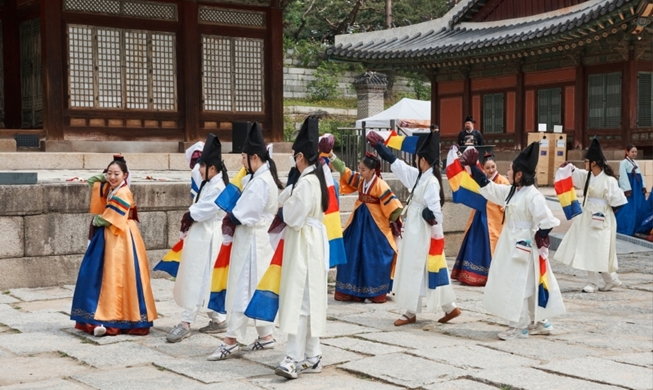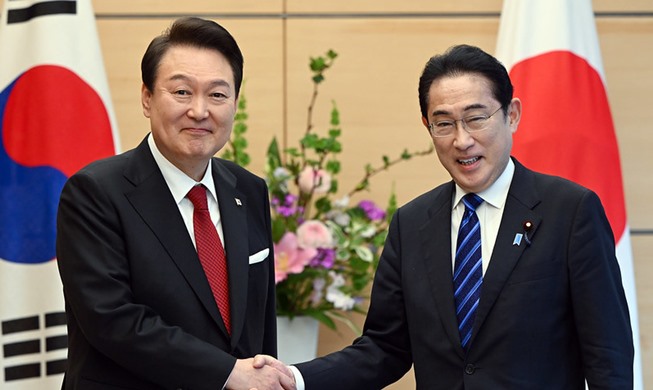-
 Korea.net's 24-hour YouTube channel
Korea.net's 24-hour YouTube channel- NEWS FOCUS
- ABOUT KOREA
- EVENTS
- RESOURCES
- GOVERNMENT
- ABOUT US
Bryan Young (28) and Michael Swift (27) are two Canadian-born ice hockey players who both play for High1, an ice hockey team based in Goyang, and who both gained Korean citizenship on January 21. The Ministry of Justice announced its decision to grant the two cousins citizenship, saying that they were both “talented professionals” and that they both received a strong recommendation from the Korean Olympic Committee.
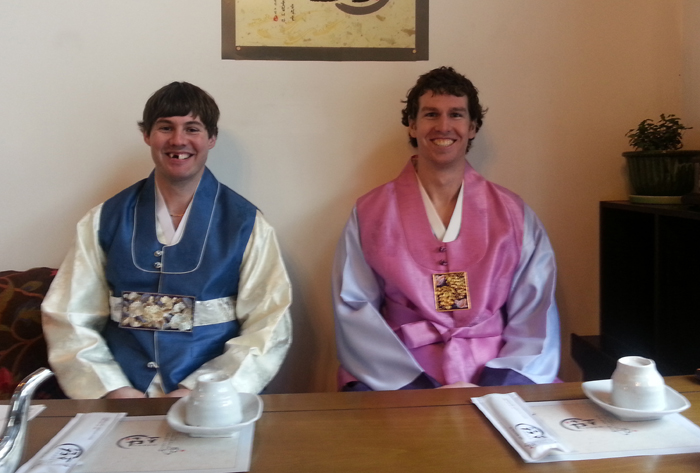
Bryan Young (right) and Michael Swift joined the league of naturalized foreign athletes in Korea. (Photo courtesy of the Korea Ice Hockey Association)
Young stands 186 centimeters, weighs 86 kilograms and is known for his powerful shots and his ability to play both offense and defense. Earlier in his career, he was drafted by the Edmonton Oilers in the National Hockey League (NHL) and played 17 games. Most recently, Young has played 27 games this season in the Asia League Ice Hockey (ALH), a professional ice hockey league in Korea, China and Japan. He has seven goals and 13 assists this season.
Swift has also proved himself in the ALH. He scored 39 goals and had 58 assists in 40 games for High1 last year. This season, he is the league leader in points with 31 goals and 22 assists in 28 games.
Brock Radunske (31) is another Canadian-born naturalized Korean, who became a citizen in March 2013. He is the first foreign-born ice hockey player to play for the Korean national ice hockey team. Radunske used to play in the American Hockey League, the minor league of the NHL, and came to Korea in 2008 to play for Anyang Halla, another team in the ALH.
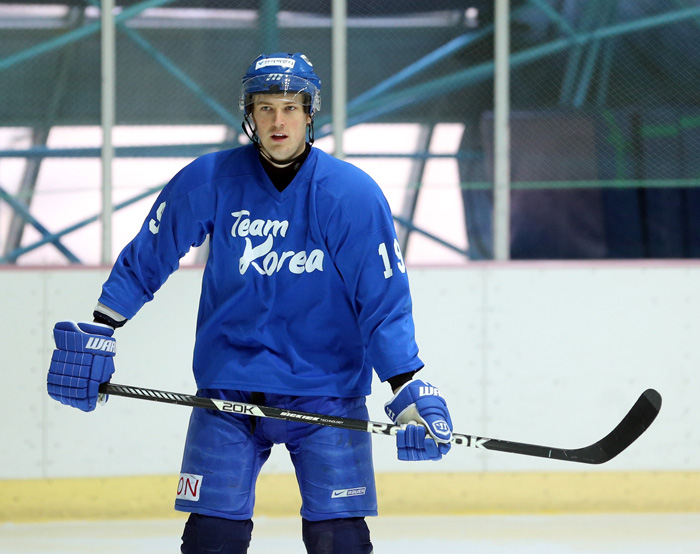
Brock Radunske, a naturalized Korean, is a member of the national team. (Photo: Yonhap News)
In 2015, the national ice hockey team will face Austria, Slovenia, Hungary, Ukraine and Japan in Division 1A of the IIHF World Championship in Goyang, Gyeonggi-do (Gyeonggi Province).
Moving beyond ice hockey, there are many other sports, including basketball, volleyball, table tennis and short track, in which foreign-born players have represented the national team.
In short track speed staking, Kong Sang-jeong (18), a third-generation ethnic Chinese living in Korea, will take part in the ladies’ relay in the 2014 Winter Olympics in Sochi. Kong, known for her explosive speed off the starting line, has plenty of competition experience and can make lightning-quick decisions in mid-race. This is the first time that a naturalized Korean will represent Team Korea in the Winter Olympics.
In basketball, Moon Tae-jong (39), born Jarod Stevenson, and Tae-young (35), born Gregory Stevenson, are two brothers who play for the LG Sakers and the Mobis Fevers, respectively. They have made their names here in Korea. Born to an American father and a Korean mother, they gained Korean citizenship in 2011 and have adopted their Korean names, using their mother’s surname. The older Moon played a major role in helping the national team finish third in the 2011 FIBA Asia Championship.
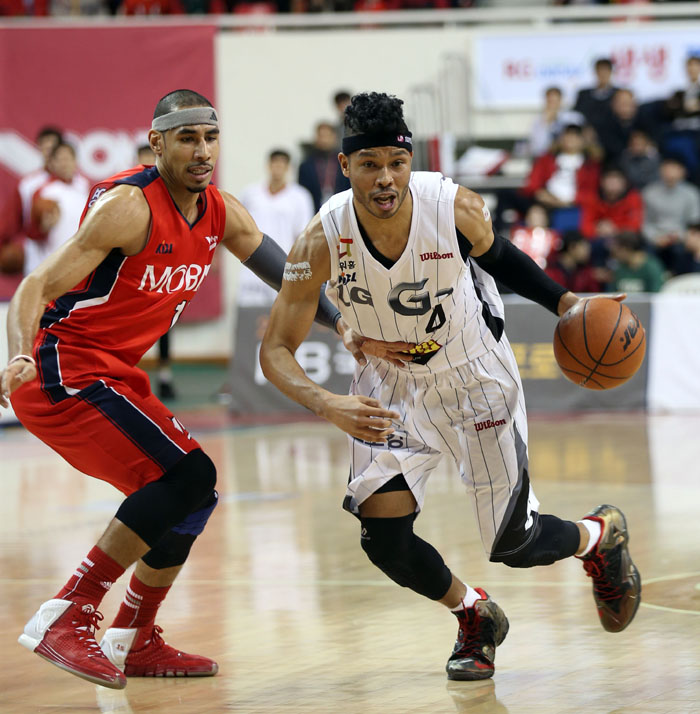
Moon Tae-jong (right) dribbles past his younger brother, Moon Tae-young, during a basketball game in Ulsan on January 21. (Photo: Yonhap News)
Elsewhere in the basketball world, Lee Seung-joon (36), born Eric Sandrin, and Lee Dong-joon (34), born Daniel Sandrin, who were also born to an American father and a Korean mother, play for the Wonju Dongbu and the Seoul Samsung, respectively. The elder Lee joined the national team for the first time in the 2010 Asian Games in Guangzhou and played a major role in helping the team win the silver medal there. Lee played against the Dominican Republic in Caracas, Venezuela, during the preliminary final for the 2012 Summer Olympics in London and recorded 21 points and six rebounds.
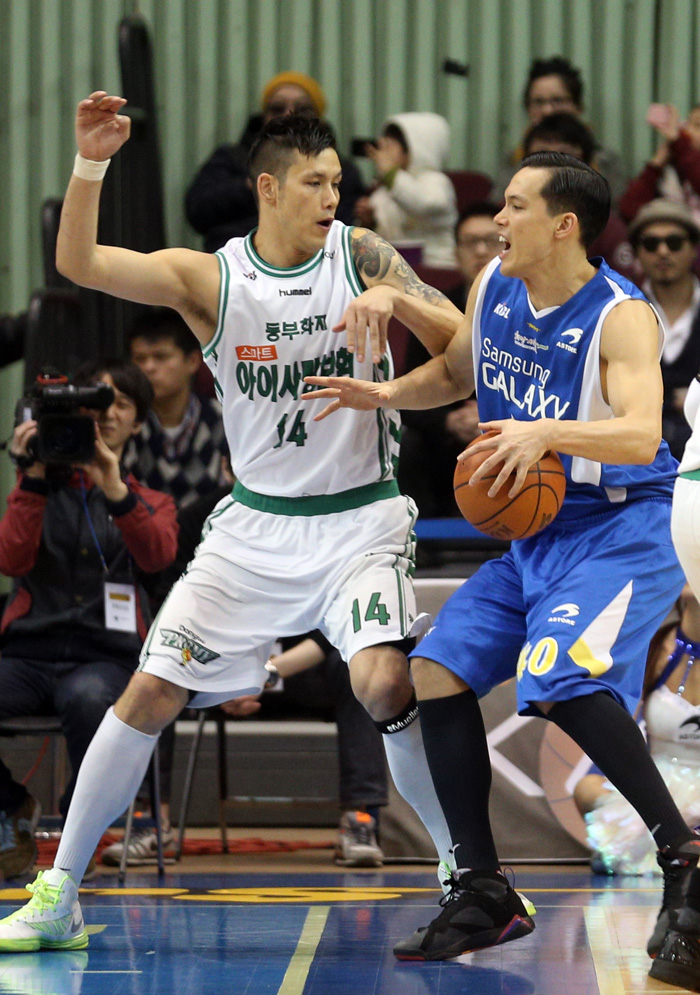
Lee Seung-joon (left) plays defense against his younger brother, Lee Dong-joon, during a March 2013 basketball game last season at Jamsil Indoor Stadium in Seoul. (Photo: Yonhap News)
The first ever naturalized Korean athlete is Who In-jung (40), who still plays volleyball for Suwon KEPCO. An ethnic Chinese, he has been a principal player for over ten years in the Korean volleyball league and is now the oldest player in the sport.
In women’s table tennis, Dang Ye-seo (33) and Seok Ha-jung (29), who both play for the Korean Air team, and Jeon Ji-hee (22) plays for Posco Energy. They all became naturalized one after another. Dang won the women's team table tennis bronze medal for Korea in the 2008 Sumer Olympics in Beijing and at the 2012 World Team Table Tennis Championships in Dortmund, Germany. Seok won a silver medal for Korea at the 2010 Asian Games in Guangzhou. In London, both Dang and Seok also represented Korea at the 2012 Summer Olympics.
Jeon, a former member of China’s national youth team, is one of the 12 members of the women’s table tennis reserve team for the 2014 Asian Games in Incheon.
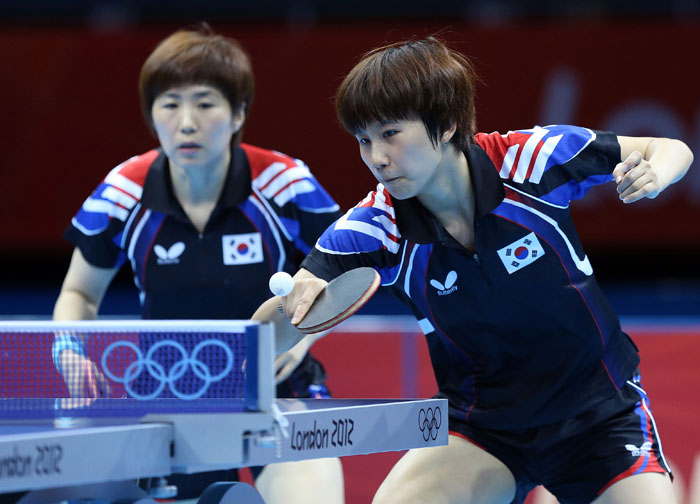
Dang Ye-seo (left) and Seok Ha-jung face off against the Singaporean team in the women’s doubles table tennis third place match at the London Excel Arena during the Summer Olympics in August 2012. (Photo: Yonhap News)
Although there aren’t any foreign-born national team members in soccer, the sport has attracted a few players who have become naturalized Koreans. Russian-born Valeri Sarychev (44) joined the Cheonan Ilhwa in 1992 and was naturalized in 2000, changing his name to Shin Eui-son. Now, he works for Busan I-Park as a goalkeeper coach.
Russian-born Denis Laktionov (37), who started playing in the K-League in 1996, obtained Korean citizenship in 2003 and named himself after his team, Lee Seong-nam. Later, he returned to Russia and worked as a coach. Then, he returned to Korea in 2013 and played for Gangwon FC. After his retirement last year, he is now a coach of a youth team in Suwon.
Croatian-born Jasenko Sabitovic (44) became Lee Sa-vic in 2004 upon naturalization. Having now retired, he is working as an agent introducing Eastern European players to Korea.
Korea.net recently held interviews with the newly-naturalized ice hockey cousins Bryan Young and Michael Swift.
Interview with Michael Swift
1. When did you come to Korea?
I came to Korea in August 2011. My cousin Bryan Young, who plays for High1, contacted me in the summer and wondered if I would come to Korea and play hockey. When my contract in the U.S. was over, I thought to myself why not go over to Korea and try it out.
2. What made you decide to become a naturalized Korean?
I’ve been in Korea for three years now. At first, I didn’t know a thing about Korea, but now I love it so much that I want to stay here as long as I can. I consider Korea my home now. I am here for eight months out of the year. I have many fans and other friends in Korea outside of hockey.
3. How do you feel about representing Korea in international competitions?
It’s a huge honor to be representing Korea at international competitions. I want to help the Korean team reach their goal to take part in the 2018 Winter Olympics. I hope I can do that during these competitions, and move Korea up in the world ice hockey rankings.
4. So far, how has been your experience playing ice hockey in Korea?
My experience in Korea has been amazing so far. Each year it gets better and better to play over here. I am more familiar with the surroundings and am learning the language every day. I can communicate better with Koreans each season. The hockey gets tougher and tougher and that’s a good thing for Korea because it means that they are doing something right.
5. What do you particularly like about living in Korea, such as food or lifestyle?
I love Korean BBQ. Also, there are so many restaurants and coffee shops. You can be out interacting with people instead of just sitting in the apartment all day. There are so many activities I’ve done in Korea other than hockey like bowling, golfing and batting cages. I’ve gone to baseball and basketball games, too. I try to keep myself busy and just explore Korea every day.
6. What are your plans in the future?
The main goal would be the 2018 Winter Olympics, but also I have to keep myself in great shape and keep playing in the Asia League, hopefully for a long time. Mostly, though, I have to prepare for the Olympics in four years’ time. I hope it will be possible for all that to come true.
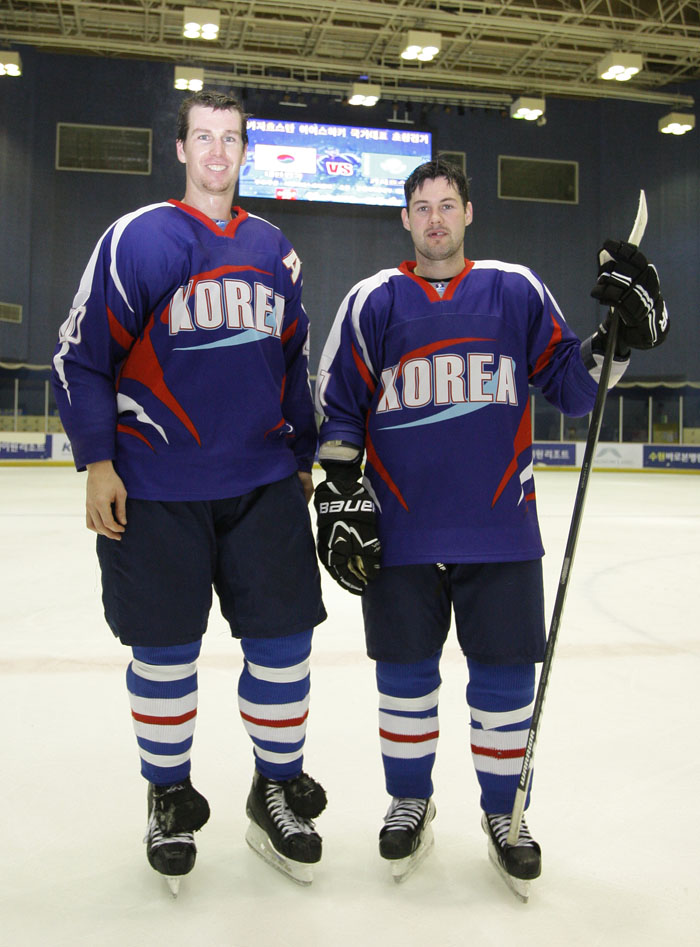
Bryan Young (left) and Michael Swift (Photo courtesy of the Korea Ice Hockey Association)
Interview with Bryan William Young
1. When did you come to Korea?
I came to Korea in August 2010. I was contacted by the High1 ice hockey team about future employment.
2. What made you decide to become a naturalized Korean? It seemed like a great opportunity to continue to give back to the development of Korean ice hockey, and for myself to potentially represent Korea at the Olympic Games.
3. How do you feel about representing Korea in international competitions?
It would be a great honor to represent Korea at international competitions.
4. So far, how has been your experience playing ice hockey in Korea?
I have had a great experience playing hockey in Korea. I have met so many good people in my travels and have got to see and enjoy many different cultures.
5. What do you particularly like about living in Korea, such as food or lifestyle?
During my first few seasons, my wife and I really enjoyed touring around Seoul and seeing and doing a lot of the traditional tourist things, such as palaces and temples. We’ve made many friends now in Korea. Now, we really enjoy socializing and hanging out with friends in and around Seoul.
6. What are your plans in the future?
My future plans are to continue to help grow Korean ice hockey. I truly believe they have the talent to do good things on the international ice hockey stage. Hopefully, the team will qualify for the 2018 Olympic Games.
By Limb Jae-un
Korea.net Staff Writer
jun2@korea.kr
Most popular
- China warmly welcomes first Korea-born giant panda Fu Bao
- First hearing-impaired K-pop act hopes for 'barrier-free world'
- Gov't to transform sports sector into future growth engine
- Int'l writers give their takes on nation's 'festive' election culture
- Novelist Hwang's 'Mater 2-10' shortlisted for Int'l Booker Prize








